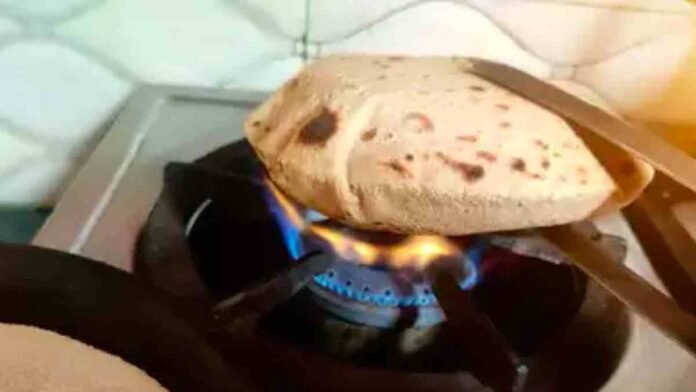This article explores a shocking claim that roti made on a direct flame gas can lead to cancer. We delve into the science behind the claim and examine its validity, providing readers with important information about potential health risks associated with cooking methods.
Roti cooked with gas might cause cancer
Roti or Chapati is a popular Indian bread that is eaten at almost every meal. It is often prepared by half-cooking it on a tawa or griddle before roasting it thoroughly on the direct flame using a tong. Yet, a few studies have found that high-temperature cooking procedures create carcinogenic heterocyclic amines (HCAs) and polycyclic aromatic hydrocarbons (PAHs). Read on to learn more about this study and the proper technique to prepare roti.
The research
According to a recent study published in the journal Environmental Science & Technology, natural gas stoves and cooktops emit levels of air pollutants such as carbon monoxide, nitrogen dioxide, and fine particulate matter that the WHO considers unsafe and are linked to respiratory illness, cardiovascular problems, and cancer, among other health conditions. Not only that, but a study published in the journal Nutrition and Cancer revealed that high temperature cooking can release carcinogenics. As a result, we wondered whether it was safe to cook chapatis in close contact with a gas flame.
The doctor’s opinion
We spoke with a well-known Medical Oncologist in Delhi – Dr. Shyam Aggarwal, a top specialist at Sir Ganga Ram Hospital, spoke about the link between high-temperature cooking and cancer. He stated that carcinogens such as HCAs and PAHs are responsible for modifying the human body’s DNA, but it is difficult to establish whether the DNA damage is causing cancer because the human body has a natural capacity to repair itself. He also stated that if high-temperature cooking is connected to cancer, the person should have consumed such meals over an extended period of time. He concluded that there is no epidemiological data to support the link between high-temperature cooking and cancer, and that anything that causes DNA change should be avoided.
Carcinogens such as heterocyclic amines (HCAs), polycyclic aromatic hydrocarbons (PAHs), and acrylamide are widely found in starchy meals and meat, according to Dr Dipanjan Panda, Senior Consultant – Medical Oncology, Indraprastha Apollo Hospitals. There is no convincing evidence that these compounds cause cancer, but given the known evidence, it is recommended to avoid cooking directly over charcoal. A preliminary study published in discovered a link between cooking on “open chulha” and gallbladder cancer. This study suggests that cooking starchy foods and meat at high temperatures may result in chemical emissions that are pro-carcinogens. Nonetheless, such cooking processes should be avoided.
Roti on the griddle
Formerly, chapatis or Rotis were cooked on a Tawa by squeezing them with a dish cloth to prevent direct contact with the flame. People began cooking chapatis on direct flame with the development of tongs. This was thought to be a simpler technique to manufacture more chapatis in less time. It was also thought to be the greatest technique to prepare chapatis since it was cooked from all sides.
Cooking roti over an open flame
According to a report published in 2011 by Dr Paul Brent, Chief Scientist of Food Standards Australia and New Zealand (FSANZ), when bread comes into direct contact with gas flames, it produces acrylamide, a chemical produced when sugar and certain amino acids are heated together during the cooking process. Despite this study was based on ‘burnt toast,’ wheat flour includes a specific degree of ‘natural sugar and protein,’ which when cooked together over direct flame can form the carcinogenic compound that is harmful for human consumption.
Is it necessary to cook on a tawa?
Shweta Shah, a Celebrity Nutritionist, was asked what she thought of chapati cooked over direct heat. She stated that, while this strategy saves time, there are a few drawbacks. Roti may not be cooked uniformly, some sections may burn, and because it is cooked directly on the flame, it may gather particles caught on the gas burner, making it unhealthy. As a result, it is recommended to use the ancient tawa and take your time creating Chapatis.
Additional foods that have been linked to cancer
According to research, when meat, such as beef, pig, fish, or chicken, is cooked at high temperatures, such as pan frying or grilling directly over an open flame, it becomes carcinogenic and increases the risk of cancer. A study also found that people who eat more hamburgers are 79% more likely to get prostate cancer.
Conclusion
According to the facts provided, it would be extremely dangerous for anyone to ingest chapati prepared over an open flame. Further research is needed, however, before concluding that “roti produced on direct flame can cause cancer.”



